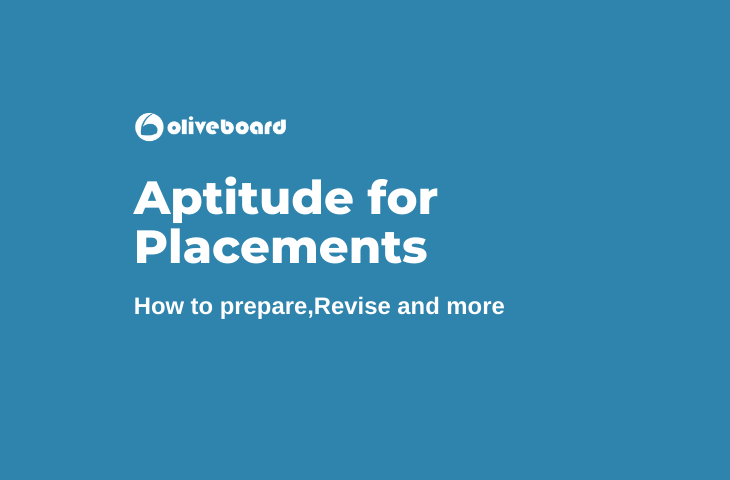Aptitude tests are the most basic technique of assessing your knowledge in various forms in a job interview. An aptitude test evaluates your mathematical, logical, and linguistic abilities. Most candidates have the necessary technical capabilities, but they lag in aptitude tests, missing out on the chance to land their desired job. Let us look at few pointers on how to prepare Aptitude for placements in this article.
How to prepare for Aptitude for placements
Prepare the framework
The first step is to create a framework for covering all of the aptitude test topics, as a decent study plan is half the battle won.
- Choose between offline and online learning methods based on your preferences. If you’re offline, go to the library and select books relevant to the topics; if you’re online, take online tests and quizzes.
- Get in touch with your college seniors, as they have previous aptitude test experience. Take samples papers & any materials you can from them, as well as any advice.
- Make it a habit to read newspapers. Even a few minutes of reading each day can improve your overall performance.
- To cover all of the areas in the aptitude test, such as Quantitative Ability, Verbal Ability, and Logical Ability, look for online and offline resources.
Begin preparing for the aptitude test.
The aptitude exams cover the most fundamental topics you may have learned in high school and college. The aptitude test is divided into three categories: Quantitative aptitude, logical reasoning, and verbal ability.
1. Quantitative aptitude: A quantitative abilities exam systematically evaluates a candidate’s ability to do particular activities and respond to a variety of scenarios.
The following are some of the quantitative aptitude topics.
| Basic Mathematics | Divisibility, HCM & LCM, Number’s systems, Decimal Fractions & Power |
| Applied Mathematics | Profit & Loss, Simple and compound interest, Time and Work, Ratio and Proportion Speed and DistanceInverse, Boats and Streams |
| Engineering Mathematics | Logarithms, Pipes and Cisterns, Permutations & Combinations, Probability |
2. Logical Reasoning: The purpose of logical reasoning tests is to assess your ability to reason. Logical reasoning does not necessitate any prior knowledge. It’s entirely dependent on how well you interpret the issue & use your brain to discover the answer. You must devote some time to learning various tactics and tips for answering specific questions in this section.
The following are some of the Logical Reasoning topics.
| Inductive Reasoning & Objective Reasoning | Embedded images, Coding pattern and Number series pattern recognition, Mirror and Water ImagesAnalogy and Classification Picture Series and Sequences |
| Deductive Reasoning | Coding deductive logic, Data Sufficiency, Directional Sense, Logical Word Sequence, Cubes and cuboids, Selection decision tables, Puzzles, Shape Construction |
| Abductive Reasoning | Logical word sequence, Data sufficiency |
3. Verbal ability: You must devote some time to learning various tactics and tips for answering specific questions in this section. This section does not demand lengthy computations or solutions; thus, it will be the most scoring if candidates are well prepared.
The following are some of the Verbal ability topics.
| Vocabulary | Synonyms, Antonyms, Idioms and Phrases, Contextual Vocabulary, One Word Substitution |
| Grammar | Error Identification, Sentence Improvement and Construction Fill in the Blanks Match the Columns |
| Comprehension | Reading Comprehension, Paragraphs |
Revise
Revision is a great way to test your knowledge. After you’ve read all of the books on the subjects and practiced the exercises by completing mock and demo tests, you’re ready to go on to the next step, which is revision. You will have an extensive understanding of the paper pattern, syllabus, and tips & tricks on these three topics. It’s time to put your knowledge to the test by reviewing key topics and completing practice papers.
Conclusion
Since you now know what to study & how to study, you may prepare with a clear mind and commitment to get exceptional outcomes. We hope this article on how to prepare for Aptitude for placements was helpful.
FAQ’s
R.S. Aggarwal – Quantitative Aptitude for Competitive Examinations and Arun Sharma – Quantitative Aptitude for CAT
Quantitative aptitude, logical reasoning, & verbal ability are the three components of the aptitude tests.
At least 2-3 months prior to the interview scheduled date.
Hi, I’m Tripti, a senior content writer at Oliveboard, where I manage blog content along with community engagement across platforms like Telegram and WhatsApp. With 3 years of experience in content and SEO optimization, I have led content for popular exams like SSC, Banking, Railways, and State Exams.
